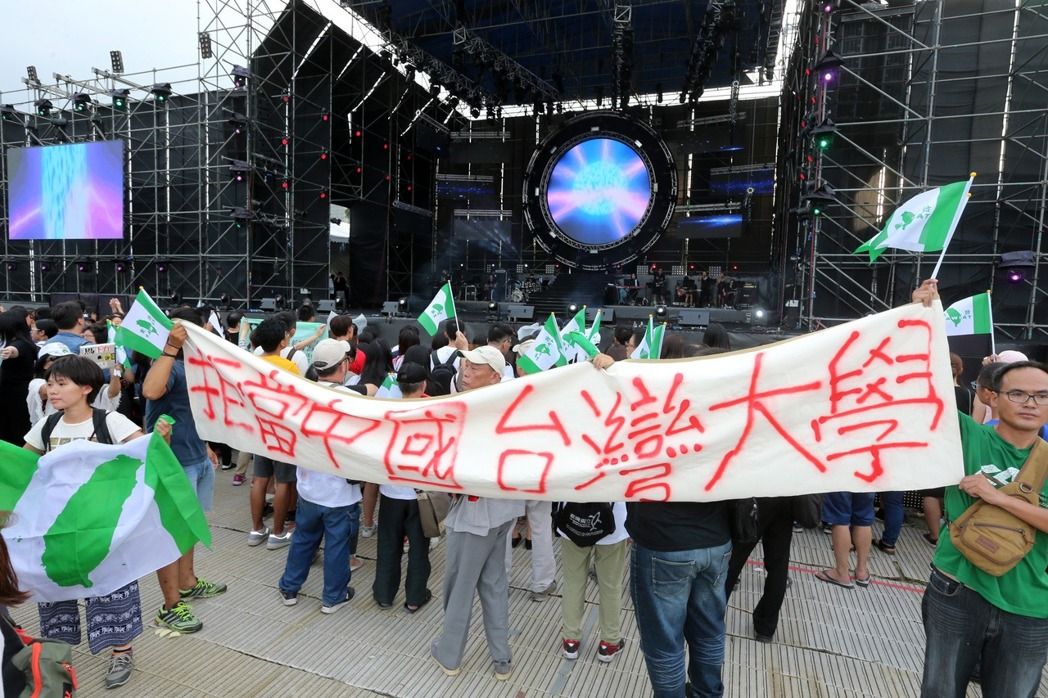by Brian Hioe
語言:
English
Photo Credit: Ko Wen-Je/Facebook
QUESTIONS ABOUT attacks on students and pro-independence demonstrators at the Sing! China event last week remain unresolved, with collusion between Taipei city officials, pro-China gangsters, and the Chinese government itself now alleged at high levels. Many questions remain to be answered not only by Ko Wen-Je’s political administration and the Taipei city police, but also as to why the Mainland Affairs Council would allow the event to take place.
Adding weight to accusations that the Sing! China event took place to begin with as a stratagem of China’s “United Front” strategies directed at co-opting Taiwanese political forces, is the revelation that Li Wenhui of China’s Taiwan Affairs Office, was present on-site at the Sing! Taiwan event and was involved in the decision to call the event to a halt after the decision along with Taipei Department of Cultural Affairs and National Taiwan University officials. This contradicts claims by Taipei city government officials and others that the Sing! China event was only a cultural activity without any political intent.
Again, the Sing! China event was held in Taiwan as a result of city-level exchanges conducted between Taipei mayor Ko Wen-Je and Shanghai city officials in the past few years, and Ko has generally shrugged off past accusations that China was seeking to co-opt him using “United Front” strategies through these city-level exchanges. However, Li’s presence at the event, as well as past mentions of the event by China’s Taiwan Affairs Office, raises China’s direct involvement in the event in which it seems no longer possible to deny the presence of the “United Front”.
 Photo credit: UDN
Photo credit: UDN
It may be that with the political crisis of the KMT and because it appears unlikely that the KMT will take power again, politicians beyond traditional pan-Blue and pan-Green divides such as Ko Wen-Je are now being targeted for co-optation by China through the “United Front”. This may have, in fact, been successful, seeing as despite the violent attacks on pro-independence demonstrators by members of pro-China political groups with known ties to organized crime at the event, Ko has continued to defend the event as a success and shows no signs of backing away from city-level exchanges with China.
It further remains a question for National Immigration Agency officials and the Ministry of Defense why Li was quietly allowed into Taiwan to begin with, as well as why the government did not take a proactive stance regarding the event taking place when it seems it would inevitably touch on sensitive cross-strait issues. Some have suggested that the presence of pro-China demonstrators with a history of political violence and connections to organized crime at the event may have been because they were mobilized by China as well that, given that the possibility of pro-independence demonstrators protesting the event was highly likely seeing as the event took place at National Taiwan University, this was a deliberate set-up in the hopes that a clash between the two groups would occur in a manner that would damage the credibility of pro-independence political actors.
Nevertheless, seeing as pro-independence demonstrators tend to be mostly peaceful in their demonstrations, this does not appear to have had the intended effect, with pro-China groups come under fire not only for their use of violence against students and peaceful demonstrators, but their ties to organized crime. As a result, Taiwanese police are currently conducting a sweep of organized crime groups with ties to pro-China political parties such as the Four Seas gang and the Bamboo Union gang, whose former leader, “White Wolf” Chang An-Lo, was a killer of political dissidents for the KMT during the authoritarian period and has since become the leader of the pro-China Chinese Unification Promotion Party.
However, Taiwanese police are further accused of publicly announcing their plans to raid organized crime groups as a way to tip these groups off beforehand about planned raids, and some view it as suspicious that Taipei police took such a light hand to violent pro-unification demonstrators when they attacked pro-independence students. Taiwanese police are sometimes seen as slanting more towards the pan-Blue camp, given that the police were privileged during the period of KMT rule as the KMT’s enforcers, and rewarded with high social status and generous retirement pensions—hence why police are also accused of siding with pan-Blue demonstrators upset at the planned pension reforms of the Tsai administration.
Film credit: 梅海強
This is in part why Taiwanese police were seen as having taken little action during the Sunflower Movement or 2015 Ministry of Education occupation when peaceful demonstrators were attacked by pro-China groups. Corruption on the part of Taiwanese police or collusion with organized crime is also not unheard of.
And, indeed, some evidence as to collusion between pro-China attackers at the Sing! China event and Taipei police exists, with netizens discovering through a “human flesh search engine” that several of the attackers at the Sing! China event previously filmed a music video with the cooperation of the Taipei city government and police. Strangely enough, the MV evidenced high production values and was about gangster violence, and only had just over a hundred views before coming to the attention of netizens.
As such, many mysteries still remain to be cleared up about the Sing! China event. And attempts by Ko Wen-Je or others to claim that the event was just an unfortunate incident could simply be attempts to play dumb. The implications are large and ultimately may involve many levels of government.

